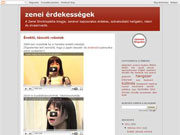1986 a Run DMC, a Beastie Boys, és velük a harmadik rapgeneráció aranyéve volt...
disc
disc/disk/disque: hanglemez, korong
Disk and disc are the two alternative spellings of the descriptive word for things of a generally thin and circular geometry. These variations are due to the way in which the words originated. The discussion here somewhat focuses on how the word applies to data-storage media.
The earlier word is disk, which came into the English language in the middle of the 17th century, and (probably following pre-existing words such as risk) it was spelled with a k. The spelling disc was introduced in the 18th century, following an increasing tendency to base the spelling of words on their roots: in this case the Latin word discus and the Greek word δισκος (note that kappa in Greek is usually transliterated by c rather than k). In the 19th century, disk became the conventional spelling for audio recordings made on a flat plate, such as the gramophone record; this usage gave rise to the modern term disc jockey.
Early BBC technicians differentiated between disks (in-house transcription records) and discs (the colloquial term for commercial gramophone records, or what the BBC dubbed CGRs).
By the 20th century, the k-spelling was more popular in America, while the c-spelling was preferred in England. In the 1950s, when the American company IBM pioneered the first hard disk drive storage devices, the k-spelling was used. Consequently, in computer jargon today it is common for the k-spelling to refer mainly to magnetic storage devices (particularly in British English, where the term disk is sometimes regarded as a contraction of diskette, a much later word and actually a diminutive of disk).
Some latter-day competitors to IBM prefer the c-spelling. In 1979 the Dutch company Philips, along with Sony, developed the compact disc medium; here, the c-spelling was chosen. The c-spelling is now used consistently for optical media such as the compact disc and similar technologies.
